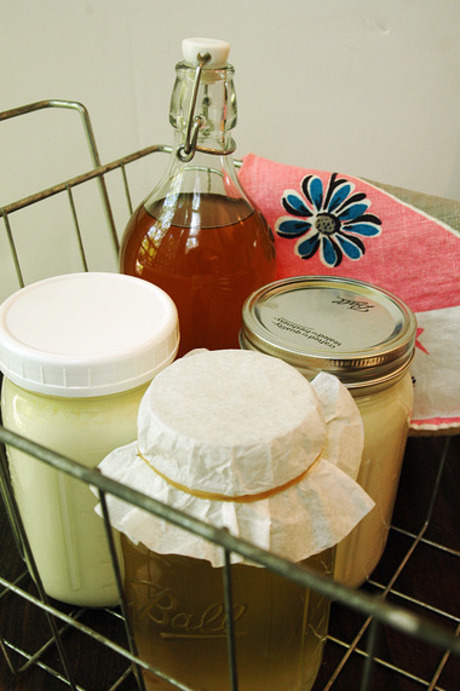Guest Post: Katy’s Culture Club
This post is a follow-up to this recent post about reinstating the age-old barter and trading food with a local friend. In the last few months, I’ve met a great group of ladies in Indianapolis, one of whom told me about her fermented food trade, aptly named Culture Club. I asked her to share this brilliant idea with the HGGH readership. Please welcome Katy to the guest blog fold!
Katy Carter is a food-obsessed mother-of-three who claims that cooking helps her avoid Prozac. A southern transplant to the heartland (Indianapolis), she blogs whole-food recipes and stories at www.katyshecooks.com.
________________________________________________________
A couple years ago, I jumped on the cultured-food-bandwagon. Convinced that these foods are integral to good health, and delicious to boot, I leapt full-force into all sorts of letting-things-sit-out-on-the-counter projects. It became a bit, shall we say, overwhelming (my husband was suspicious, grumbling something about our kitchen becoming the lab playground of a mad scientist — emphasis on “mad,” since a scientist I am not).
I ended up having a conversation with a friend who was also venturing into the business of fermentation, and she knew a few other women in the same boat. We started an email chain with the idea of joining forces, combining resources. Since we were all trying (and mildly failing) to make these different foods, why not let each of us be responsible for one item, make enough for the group, and swap?
Calling ourselves the Culture Club (Boy George, anyone?), we quickly divvied up jobs based on comfort-level with the process and availability of necessary equipment. There were five of us, so we each took a job of making: yogurt, dairy kefir, water kefir, kombucha, and sprouted flour (not a cultured food, but something we were all interested in using). We discovered that the group wouldn’t function with more than five people, as it would mean making more than a gallon of extra goods, meaning more than one “batch” — the goal was to get a quart of each cultured food every week.
We found it easy to swap each week, as we all went to the same church and could trade every Sunday. We also kept it low-key — all of us are busy gals with kids and jobs, so we were forgiving when it came swap day and one of us just didn’t get our stuff done (sometimes this was unavoidable, as cultured foods can be finicky when weather changes).
An unexpected plus of Culture Club was the residual instant community. We exchanged epic strings of group emails, covering concerns we share given our obsession with cultured foods. We ended up going in with each other on bulk food orders from our favorite local and online suppliers (twice we had “honey parties” where we messily divided up a 5-gallon bucket of raw local honey), and had a support group for all kitchen (and health-related) fiascoes. And only once or twice did we give in to the urge to don black eyeliner and hats, and have an impromptu 80’s dance party.
To start a culture club of your own, look for people with whom you overlap regularly (or can overlap, easily), who share your interest in culturing & fermenting foods. Keep the group to 4-5 people (connect extras to each other so they can start a new group), be forgiving when someone shows up empty-handed, and prepare to wallow in an abundance of mad science.

